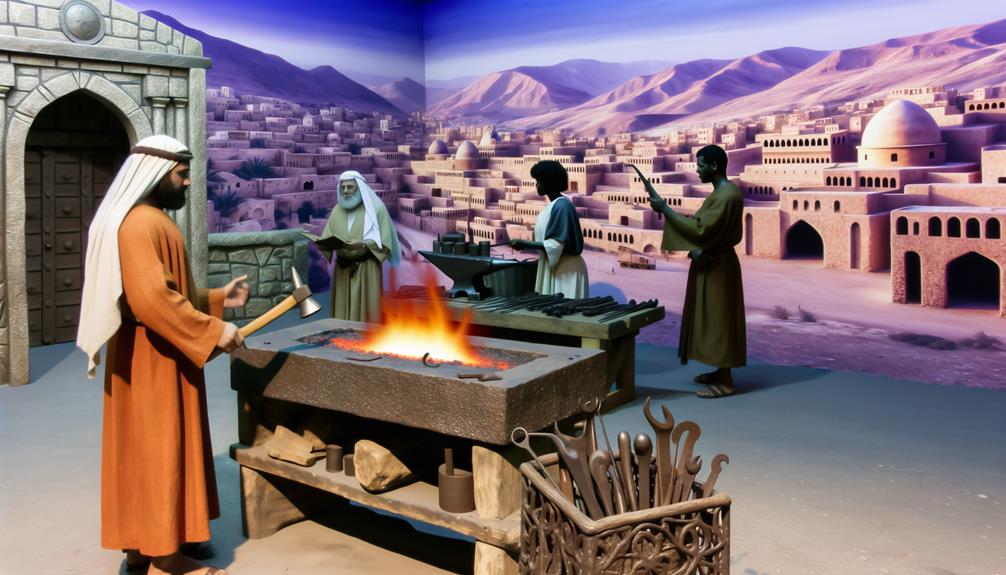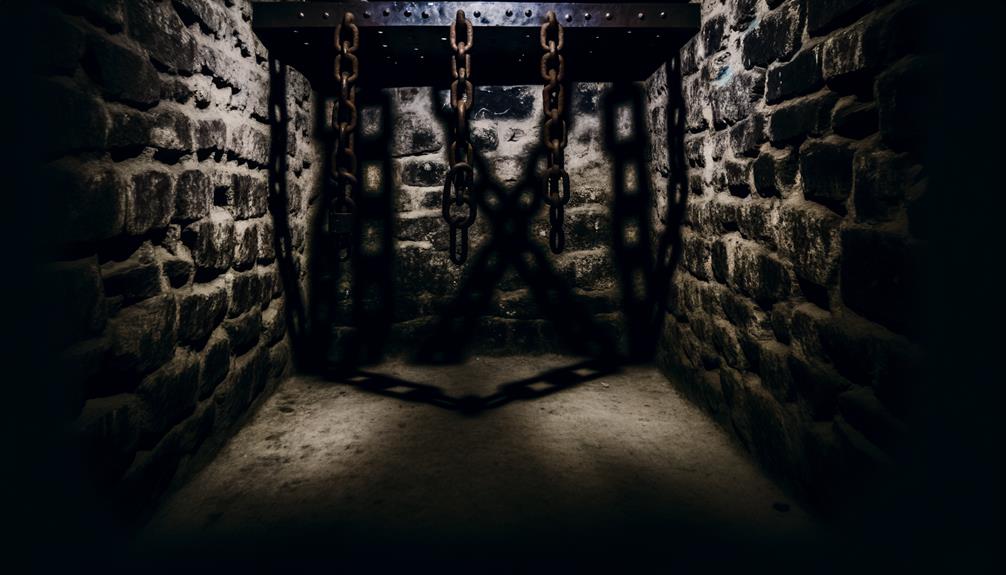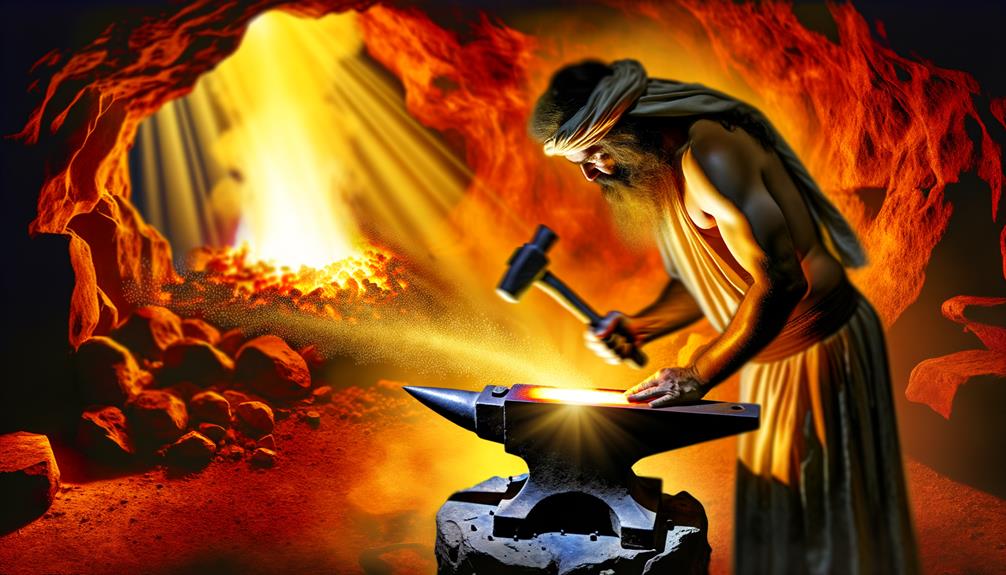Meaning of Iron in the Bible: Strength and Judgment
In the Bible, iron symbolizes strength, endurance, and divine judgment, reflecting its integral role in ancient warfare, agriculture, and craftsmanship. It first appears in Genesis 4:22 with Tubal-Cain, an ironworker, and consistently marks societal advancements and divine providence.
Iron chariots in Judges 1:19 denote military might, while Deuteronomy 33:25 uses iron to illustrate God’s protective power. Proverbs 27:17’s ‘iron sharpens iron’ emphasizes mutual edification, signifying constructive relationships.
Isaiah 48:4 and Daniel 2:40 use iron to depict human obstinacy and imperial strength, underscoring iron’s multifaceted theological significance. Exploring further reveals deeper insights into its symbolic richness.

Meaning of Iron in the Bible: Symbol of Strength, Judgment, and Authority
| Symbolic Aspect | Biblical Reference | Spiritual Insight |
|---|---|---|
| Strength and Endurance | Iron used in weapons and structures | Signifies resilience, power, and steadfast faith |
| Judgment and Rule | Iron rod symbolizes righteous judgment (Psalm 2:9) | Represents divine authority and unbreakable justice |
| Hardness of Heart | Iron hearts in rebellion (Jeremiah 6:28) | Warns against spiritual stubbornness and pride |
| Refinement and Testing | Iron sharpened and forged (Proverbs 27:17) | Illustrates growth through challenge and community |
| Nations and Kingdoms | Iron empire in Daniel’s vision (Daniel 2:40) | Reflects strength and severity of earthly kingdoms |
Iron in Biblical History

Iron, a symbol of strength and resilience, is first mentioned in the Bible in Genesis 4:22, where Tubal-Cain is noted as an instructor of every artificer in brass and iron. This early reference underscores iron’s pivotal role in human civilization and biblical history.
As a metal, iron became integral to various aspects of life, including warfare, agriculture, and craftsmanship. The historical context reveals that ironworking knowledge was advanced and significant in ancient societies, marking a shift from the Bronze Age to the Iron Age.
Scriptural references to iron, such as in Deuteronomy 3:11 and 1 Samuel 17:7, highlight its importance in both practical and symbolic dimensions, reflecting societal advancements and divine providence in human endeavors.
Symbol of Strength

In the biblical narrative, the symbolism of strength is frequently encapsulated through references to iron, signifying both divine fortitude and human resilience. Iron’s robust nature is highlighted in verses such as Deuteronomy 33:25, “Your bars shall be iron and bronze,” illustrating divine protection.
Additionally, Isaiah 48:4 references the Israelites’ obstinacy, describing their necks as an “iron sinew,” emphasizing unwavering strength.
| Scripture Reference | Symbolism | Application |
|---|---|---|
| Deuteronomy 33:25 | Divine Protection | Spiritual Resilience |
| Isaiah 48:4 | Human Obstinacy | Commitment to Faith |
| Job 40:18 | Physical Strength | Endurance in Adversity |
| Psalms 107:16 | Breaking Chains | Liberation from Bondage |
| Ezekiel 4:3 | Impenetrable Wall | Defense against Evil |
Such references encapsulate iron’s role as a metaphor for enduring strength and divine support.
Iron in Warfare

Throughout the biblical texts, the utilization of iron in warfare illustrates not only the technological advancements of ancient civilizations but also the symbolic representation of divine judgment and human conflict.
Iron chariots, mentioned in Judges 1:19, epitomize military superiority and the formidable challenge faced by Israelite forces. The Philistines’ monopoly on ironworking (1 Samuel 13:19-22) underscores the socio-political control exerted by dominant powers.
Additionally, the prophetic imagery in Micah 4:13, where iron signifies strength in executing divine justice, reveals its theological depth. The weaponry, including swords and spears forged from iron, not only served practical purposes but also embodied metaphors for God’s intervention and the moral battles within human history, enriching the scriptural narrative.
Tools and Instruments

Beyond its martial applications, the biblical portrayal of iron extends to its use in tools and instruments, reflecting the material’s significance in daily life and craftsmanship.
Iron tools, referenced in passages like 1 Samuel 13:19-21, were essential for agriculture and construction, symbolizing human ingenuity and divine provision. The utilization of iron in daily implements showcases the gradual technological advancements of ancient Israel.
| Biblical Reference | Tool/Instrument |
|---|---|
| 1 Samuel 13:20 | Plowshare |
| Deuteronomy 27:5 | Iron chisel |
| Isaiah 44:12 | Blacksmith’s hammer |
These scriptural references highlight iron’s crucial role in shaping a society capable of sustaining itself and constructing places of worship, thereby underscoring its theological and historical importance.
Symbol of Oppression

Iron in the Bible is often depicted as a symbol of oppression, exemplified by its association with chains, fetters, and the subjugation of peoples. This is seen in passages like Psalm 107:10 and Deuteronomy 28:48.
These scriptures vividly portray iron as a metaphor for the harsh conditions of captivity and forced labor. Historically, iron chains and shackles were employed to restrain prisoners and slaves, reinforcing the notion of iron as a tool of domination and control.
Psalm 107:10 describes those who ‘sat in darkness and in the shadow of death, bound in affliction and irons.’ Meanwhile, Deuteronomy 28:48 prophesizes a yoke of iron upon the necks of those who disobey God, symbolizing severe and inescapable bondage.
Iron and Idolatry

In biblical texts, iron is frequently associated with idolatry, serving as a material for crafting false gods and objects of worship, as vividly illustrated in passages such as Isaiah 44:12 and Ezekiel 22:20.
In Isaiah 44:12, the blacksmith’s labor with iron to create idols underscores the futility of idol worship. Similarly, Ezekiel 22:20 employs iron to symbolize the impurities and corruptions of idolatrous practices.
Historically, iron’s durability and strength made it a favored medium for idol makers, contrasting with the ephemeral nature of the gods it represented.
These scriptural references highlight a theological critique, portraying iron not merely as a physical substance but as a symbol of spiritual defilement and human rebellion against divine authority.
Prophetic Imagery

While iron’s association with idolatry underscores its negative portrayal, prophetic texts also utilize iron as a powerful symbol to convey divine judgment and strength.
The prophet Isaiah, for instance, speaks of iron with regard to unyielding strength and unbreakable resolve (Isaiah 48:4).
In Ezekiel, iron represents divine retribution, with God declaring He will make Jerusalem a city of iron, signifying impending judgment (Ezekiel 4:3).
Additionally, Daniel’s visions include iron as a metaphor for the strength and inflexibility of empires (Daniel 2:40).
These scriptural references indicate that iron, in a prophetic context, underscores the themes of divine authority and the inevitable consequences of disobedience, thereby enriching the biblical narrative with layers of theological significance.
Iron in Proverbs
In the Book of Proverbs, iron is utilized as a metaphor to illustrate principles of mutual edification and personal growth, as encapsulated in Proverbs 27:17, ‘As iron sharpens iron, so one person sharpens another.’
This imagery not only underscores the value of constructive relationships in fostering wisdom and character but also highlights the themes of strength and discipline essential for righteous living.
Additionally, the historical context of iron as a durable and essential material enhances its symbolic representation of resilience and moral fortitude within the biblical narrative.
Iron Sharpens Iron
Proverbs 27:17 famously declares, ‘As iron sharpens iron, so one person sharpens another,’ elucidating the importance of mutual growth and accountability within a community. This metaphor highlights the dynamic interplay of relationships in fostering spiritual and intellectual refinement.
Historically, the process of sharpening iron tools required precision and effort, symbolizing the diligent, sometimes challenging, interactions necessary for personal development. Biblically, this verse underscores the necessity of communal support and constructive criticism, resonating with themes found in Ecclesiastes 4:9-10, which extol the benefits of companionship.
Theologically, it invites believers to engage in intentional, edifying relationships, affirming the scriptural principle that spiritual maturity arises through communal interdependence and mutual encouragement, as exemplified by the early Christian communities.
Strength and Discipline
Within the book of Proverbs, iron frequently symbolizes strength and discipline, epitomizing the virtues necessary for righteous living and moral fortitude.
Proverbs 27:17 states, ‘As iron sharpens iron, so one person sharpens another,’ illustrating the constructive influence of disciplined relationships.
In ancient Israel, iron’s durability and utility in tools and weapons made it a powerful metaphor for resilience and ethical rigor.
Theological interpretation suggests that just as iron tools are forged and honed, so too must individuals cultivate inner strength and discipline through divine wisdom.
Proverbs consistently underscores the importance of these attributes in achieving a life aligned with God’s will, highlighting the transformative power of disciplined living in the pursuit of spiritual and moral excellence.
Spiritual Lessons

The biblical depiction of iron serves as a profound metaphor for spiritual strength and endurance, as seen in verses such as Proverbs 27:17, ‘As iron sharpens iron, so one person sharpens another.’
Additionally, iron’s association with divine judgment is evident in scriptures like Daniel 2:33-35, where the iron legs of Nebuchadnezzar’s statue symbolize the unyielding nature of God’s sovereign rule.
These scriptural references offer rich insights into the spiritual lessons that iron conveys within a theological and historical framework.
Strength and Endurance
Iron in the Bible often symbolizes strength and endurance, reflecting the steadfast faith and unwavering commitment expected of believers. This metaphor is deeply rooted in biblical history, as iron was a critical material for tools and weapons, signifying resilience and durability.
Proverbs 27:17 states, ‘As iron sharpens iron, so one person sharpens another,’ illustrating the mutual reinforcement of spiritual strength among believers. Additionally, Deuteronomy 33:25 promises, ‘Your bars shall be iron and bronze, and as your days, so shall your strength be,’ emphasizing divine fortitude granted to the faithful.
Consequently, iron serves as a powerful emblem of spiritual fortitude, encouraging believers to maintain their faith with the same enduring strength that iron possesses.
Divine Judgment Symbolism
In biblical literature, iron frequently symbolizes divine judgment, illustrating the inescapability and severity of God’s righteous decrees. This imagery is rooted in various scriptural passages, reflecting iron’s association with strength and unyielding nature. For instance, the prophet Daniel interprets Nebuchadnezzar’s dream, where iron represents a kingdom that crushes all others (Daniel 2:40).
Psalm 2:9: ‘You shall break them with a rod of iron,’ symbolizing God’s authority to impose judgment.
Deuteronomy 28:23: ‘And your heavens which are over your head shall be bronze, and the earth which is under you shall be iron,’ depicting the harshness of divine punishment.
Revelation 19:15: ‘He will rule them with a rod of iron,’ indicating Christ’s unyielding judgment.
These references collectively underscore iron’s role as an emblem of divine retribution.
Conclusion
Iron, often depicted as a symbol of strength and oppression, paradoxically underscores both divinely ordained fortitude and human frailty in biblical narrative.
Its presence in tools, warfare, and prophecy reveals a complex interplay between divine justice and human rebellion.
The Proverbs’ wisdom, juxtaposed with iron‘s unyielding nature, offers profound spiritual lessons.
Consequently, iron’s duality in scripture—both as an instrument of construction and destruction—serves as a metaphor for mankind’s struggle with righteousness and sin.






